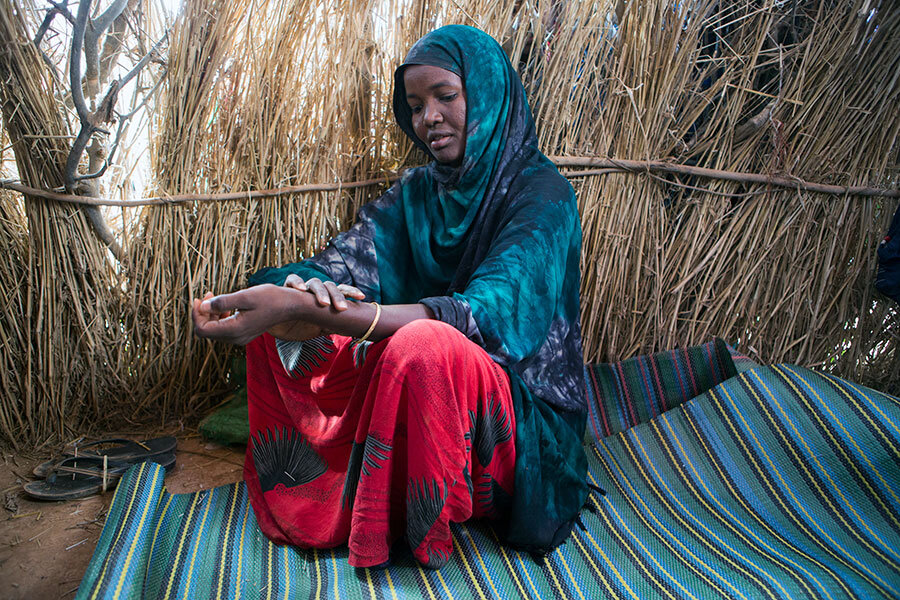In Ethiopia, drought shoves the ordinary – even marriage – just out of reach
Loading...
| Shabelle Zone, Ethiopia
In another life, it would have gone like this: Duniya in a floor-length dress, something gauzy and loudly colored; Muftah tall and slender and serious beside her.
Duniya and Muftah. Muftah and Duniya. They had known each other since they were kids, when they spent long, slow days together walking their families’ cattle and camel herds across the scrubby brush to pasture or water. For a long time, they were friends, close ones, until one day they were not only that anymore. It was that simple, she says, and that obvious.
She thinks of it often, that wedding that would have been. There would have been seven days of dancing – the entire village gathered around them – and fresh roasted goat every night. She would have eaten soor, a soft corn porridge, mashed with milk, butter, and sugar, and worn a different new dress each night. And then, when it was done, she and Muftah would have slipped quietly into the rest of their lives.
Instead, she is here – in a sun-baked settlement of displaced persons near the market town of Gode – and he is there – 40 miles away in the parched village where they both grew up. She hasn’t seen him in two months. She worries, she says, that she never will again.
Since rains first failed to fall in this eastern region of Ethiopia in early 2016, drought has disrupted life in ways seismic enough to register – if barely – on the Richter scale of global disasters. By April, nearly 300,000 people had been displaced from their homes by drought in the Somali Region, and country-wide, the government estimates that 7.81 million people are in urgent need of food, water, and other humanitarian assistance. Aid groups and Ethiopia’s government have warned that food aid may run dry as soon as mid-July.
But at close range, a drought like this one does even more than leave people sick or hungry or far from home. It warps the shape of what is possible. It shoves the ordinary just out of reach.
For Duniya and Muftah, the future should have been set. By the time Ethiopia’s government and the Famine Early Warning Systems Network (FEWS Net) began warning of severe incoming drought early last year, the elders in their families had already met and set a plan for their wedding. Muftah would pay a hefty bride price (though one that was worth it, both families agreed) of ten camels and ten cows, and they would hold the aroos – that seven day party – during gu, the rainy months at the beginning of 2017.
Their plan didn’t fall apart all at once, but in slow motion.
Over the next several weeks, the pastures their village had always grazed on began to turn dry and chalky. Muftah’s camels grew skinny and listless. First one died, then another.
In six months, they were all gone – the entire life savings of his family withered to nothing.
“I knew then that we could not get married anymore,” Duniya says. Without the bride price, after all, there could be no wedding. And without the wedding, there could be no life together. That was the tradition – and it didn’t change just because the weather did.
Then, early this year, Duniya’s parents made a decision: they would leave their village and walk towards the paved road 40 miles away. It was a place they could be seen by the aid convoys and the water trucks. Their livestock had died, too, so there was little to keep them at home, and anyway, they had family members near the road. Maybe someone could help them there.
“I don’t know what to say. It was very hard to leave him,” she says quietly, staring at a patch of ground in the small thatched hut where she and her family now stay. But he had his family and she had hers, and that was that.
And so one day two months ago, they packed their remaining belongings on a cart tethered to their last two donkeys and set off. She and Muftah didn’t exchange cell numbers – neither has one – or make a plan to meet somewhere down the line. There wasn’t any point, she says.
“Even if it rains now, it won’t be enough [for us],” she says. “All our livestock is gone, and without them, we can’t have any hope.”
Nearby, an older woman clucks softly in agreement. “He loved her very much,” she murmurs. So then wouldn’t it be possible, a reporter asks, to marry some other way, without the camels? She shakes her head.
For now, there is nothing anyone can do but wait.


















